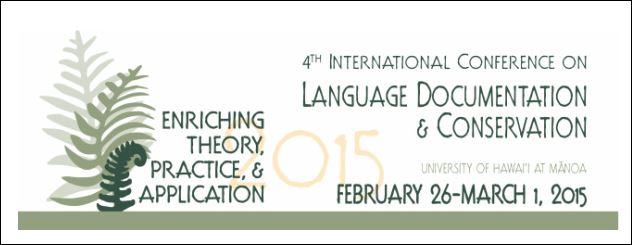 Thanks to the Charles Darwin University Vice-Chancellor’s Award for Exceptional Performance in Research, I was fortunate to be able to attend the 4th International Conference on Language Documentation and conservation at the University of Hawai’i Mānoa.
Thanks to the Charles Darwin University Vice-Chancellor’s Award for Exceptional Performance in Research, I was fortunate to be able to attend the 4th International Conference on Language Documentation and conservation at the University of Hawai’i Mānoa.
This was a fantastic opportunity to hear from a wide range of people working in the endangered languages field, with a focus on enriching theory, practice and application. This meant that most presentations had real-world applications, particularly reporting on specific projects or tools, sharing ideas about what works and doesn’t in specific contexts. There were a few sessions directly relating to archiving endangered language materials, and lots of discussion about issues that concern our project, such as ownership and copyright.
I made some good connections with other practitioners, and picked up some nuggets that will help our project. For example my conversation with an SIL representative gave me some useful ideas about how to request changes to the ISO 639-3 codes for Yolngu languages. Hearing from MPI about their process of shifting The Language Archive to a new open source repository solution is helpful to our library staff who are considering future changes along these lines. Another colleague had suggestions about displaying special characters in certain online contexts. I was also challenged to think about the pedagogical affordances of our archive, ie how accessible and useful the materials are for people learning Indigenous NT languages.
It was good to see so many Indigenous people in attendance, many First Nations people from Canada and the US (particularly Hawai’i and Alaska), many of whom are doing really interesting things with language revitalisation. And the Australian contingent was strong, with an entire morning session dedicated to “Language Pedagogy and Practice in Indigenous Australia” run by the team from the Research Unit for Indigenous Language, and a really challenging presentation about issues in Australian language revitalisation from John Hobson of the University of Sydney.
I was able to demonstrate the Living Archive site at an e-poster session, among a dozen other demonstrations. Here I was able to share with interested people about the work we’re doing, and promote the project to the wider language documentation community. I had a few queries about sharing our open-source infrastructure with other communities, and lots of brochures were distributed.
I got into some ‘live-tweeting’ with a few other tweeters, and even participated in a ‘tweet-up‘ meeting face-to-face with tweeters sharing the hashtag #ICLDC4. One even documented our conference tweeting at https://storify.com/superlinguo/icldc4.
Besides Hawai’i being a fantastic location for a conference, the event itself was incredibly well-organised and worthwhile. I look forward to building on some of the connections I made and developing some ideas to benefit the project.
